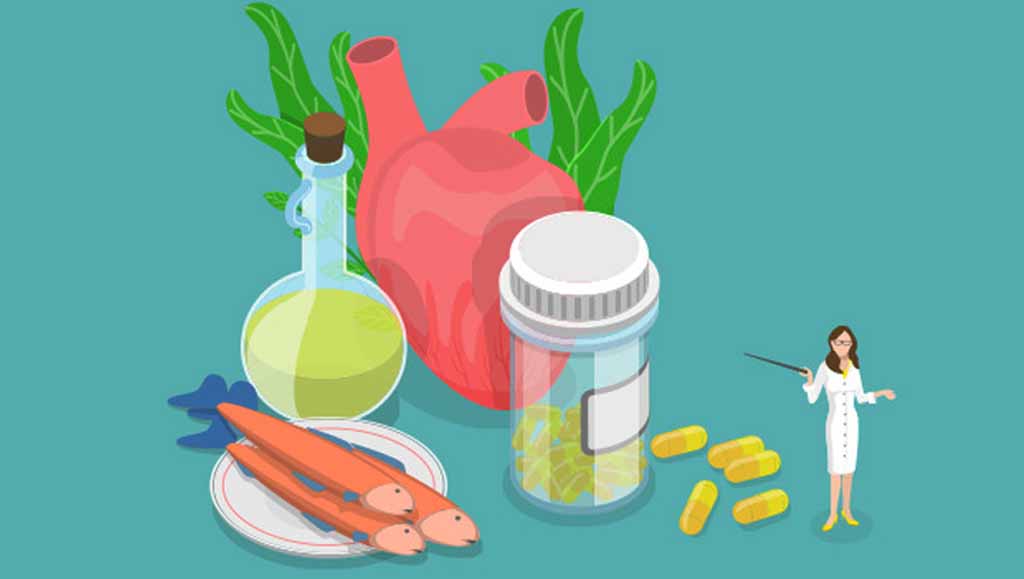When it comes to supporting heart health, few nutrients are as celebrated as omega-3 fatty acids. These essential fats, often found in fatty fish, certain plant oils, and supplements, have been extensively researched for their powerful cardiovascular benefits.
But what exactly makes omega-3s so important for your heart, and how can they help protect you from heart disease?
In this post, we’ll dive deep into the science behind omega-3 fatty acids, how they contribute to heart health, and why adding them to your diet is a smart choice for anyone looking to boost their cardiovascular well-being.
What Are Omega-3 Fatty Acids?
Omega-3 fatty acids are a type of polyunsaturated fat, meaning they contain multiple double bonds in their chemical structure.
This unique structure makes them essential for various bodily functions, particularly when it comes to reducing inflammation and supporting cell health. Omega-3s cannot be produced by the body, which is why you must obtain them through diet or supplements.
There are three main types of omega-3 fatty acids:
- EPA (eicosapentaenoic acid): Primarily found in fish and marine oils, EPA is well-known for its anti-inflammatory properties and heart health benefits.
- DHA (docosahexaenoic acid): Another fatty acid found in fish, DHA plays a key role in maintaining brain health and supporting cell function, but it’s also crucial for heart health.
- ALA (alpha-linolenic acid): This plant-based omega-3 is found in flaxseeds, chia seeds, walnuts, and certain vegetable oils. While ALA can be converted into EPA and DHA in the body, the process is relatively inefficient, which is why getting EPA and DHA directly from fish or supplements is often recommended.
How Do Omega-3s Benefit Heart Health?
The link between omega-3 fatty acids and heart health has been well-established through decades of research.
These fats have a variety of mechanisms that help protect your cardiovascular system and lower the risk of heart disease. Here’s how omega-3s can benefit your heart:
1. Reduce Triglycerides
High triglyceride levels are a major risk factor for heart disease, as they can contribute to the hardening and thickening of arterial walls, a condition known as atherosclerosis.
Omega-3s, particularly EPA and DHA, have been shown to lower triglyceride levels by reducing the liver’s production of these fats.
In fact, omega-3 supplements are often recommended for individuals with high triglycerides as part of a heart-healthy treatment plan.
2. Lower Blood Pressure
Hypertension, or high blood pressure, is another significant risk factor for heart disease and stroke. Omega-3 fatty acids can help lower blood pressure by relaxing the blood vessels and improving blood flow.
Studies suggest that individuals who consume higher amounts of omega-3s, either through diet or supplements, tend to have lower blood pressure compared to those who don’t.
3. Prevent Blood Clots
Blood clots can lead to serious cardiovascular events, including heart attacks and strokes. Omega-3s help reduce the risk of blood clots by making platelets in the blood less sticky, which means they’re less likely to clump together and form dangerous clots.
This anti-clotting effect makes omega-3s particularly beneficial for people with a history of heart disease or clotting disorders.
4. Reduce Inflammation
Chronic inflammation is a key driver of heart disease. It can damage blood vessels, leading to the buildup of fatty plaques in the arteries.
Omega-3s have potent anti-inflammatory effects, which can help reduce inflammation throughout the body, including the cardiovascular system. By lowering inflammation, omega-3s can slow down or even prevent the progression of atherosclerosis.
5. Improve Cholesterol Levels
While omega-3s don’t have a significant impact on LDL (“bad”) cholesterol, they do raise levels of HDL (“good”) cholesterol.
HDL cholesterol helps remove excess LDL cholesterol from the arteries, reducing the risk of plaque formation and promoting overall heart health.
A healthy balance of HDL and LDL cholesterol is essential for maintaining clear, flexible arteries and preventing heart disease.
6. Stabilize Heart Rhythms
Irregular heartbeats, or arrhythmias, can increase the risk of sudden cardiac death. Omega-3s help stabilize the heart’s electrical activity, which can reduce the likelihood of dangerous arrhythmias.
For this reason, omega-3s are often recommended for individuals at risk of or with a history of heart rhythm disorders.
How to Get More Omega-3s in Your Diet
The best way to ensure you’re getting enough omega-3s is by incorporating omega-3-rich foods into your diet. Fatty fish is one of the most potent sources of EPA and DHA, the two omega-3s most closely linked to heart health benefits.
Some of the best fish sources include:
- Salmon
- Mackerel
- Sardines
- Tuna
- Herring
For plant-based omega-3s, focus on foods rich in ALA, such as:
- Flaxseeds
- Chia seeds
- Walnuts
- Hemp seeds
- Canola oil
If you’re not a fan of fish or struggle to get enough omega-3s from food alone, omega-3 supplements can be a convenient alternative.
Fish oil and algal oil supplements are the most common forms, with fish oil providing both EPA and DHA, while algal oil is a plant-based source of DHA.
How Much Omega-3 Do You Need?
While there’s no official daily recommended intake for omega-3s, most health organizations recommend consuming at least 250-500 milligrams of combined EPA and DHA per day for adults.
For individuals with existing heart disease, higher doses of omega-3s may be beneficial, often under the guidance of a healthcare provider. You can achieve this amount by eating fatty fish two to three times a week or by taking an omega-3 supplement for heart health.
 Can You Take Too Much Omega-3?
Can You Take Too Much Omega-3?
While omega-3s are generally safe, it’s possible to overdo it, especially if you’re taking high-dose supplements. Very high doses of omega-3s can thin the blood too much and increase the risk of bleeding, particularly in individuals taking blood-thinning medications.
It’s always best to consult with your doctor before starting a new supplement regimen, especially if you have a medical condition or take medications.
Omega-3 fatty acids play a crucial role in supporting heart health. By lowering triglycerides, reducing blood pressure, preventing blood clots, and reducing inflammation, omega-3s provide comprehensive cardiovascular protection.
Whether you get your omega-3s from fatty fish or supplements, adding these healthy fats to your diet can significantly lower your risk of heart disease and improve your overall heart function.
Incorporating omega-3s into your diet is a simple yet effective way to support long-term cardiovascular health, making them an essential nutrient for anyone focused on heart wellness. But keep in mind that this also includes, having a healthy and balanced diet.
Disclaimer: The content provided in this post is for informational purposes only and is not guaranteed to be accurate or complete. It should not be considered as professional medical advice.
Always consult a qualified healthcare provider before making any dietary changes or using omega-3 supplements, especially if you have medical conditions or are on medication.




 Can You Take Too Much Omega-3?
Can You Take Too Much Omega-3?